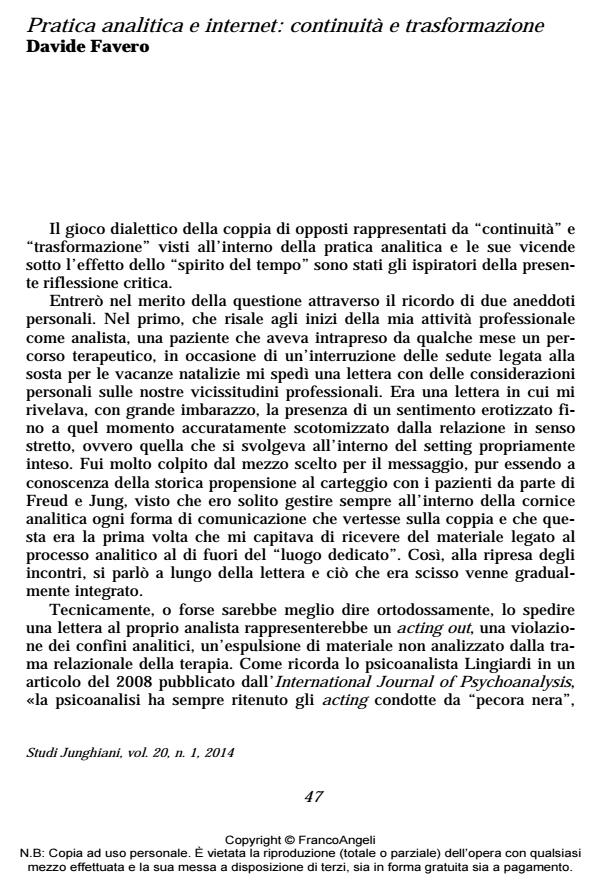Analytical Practice and Internet: Continuity and Transformation
Journal title STUDI JUNGHIANI
Author/s Davide Favero
Publishing Year 2014 Issue 2014/39
Language Italian Pages 13 P. 47-59 File size 54 KB
DOI 10.3280/JUN2014-039004
DOI is like a bar code for intellectual property: to have more infomation
click here
Below, you can see the article first page
If you want to buy this article in PDF format, you can do it, following the instructions to buy download credits

FrancoAngeli is member of Publishers International Linking Association, Inc (PILA), a not-for-profit association which run the CrossRef service enabling links to and from online scholarly content.
This paper would be a reflection on the pair of opposites represented by the terms "transformation" and "continuity" within analytical practice, and their fortunes as influenced by the "spirit of the age". The rapid expansion of digital technologies on a global scale also concerns the intimate and private space of the analyst/patient relationship, making any debate of such transformation imperative. The Internet and its associated methods of communication have crossed the boundaries of the setting. This paper does not concern itself, therefore, with developing a survey of new media, but rather with carrying out a critical analysis of the phenomenon of digitalization intersecting with analytical practice from a standpoint neither preliminarily adverse nor favourable, proposing an interpretation which maintains the "continuity"/"transformation" dialectic by means of the integration of a cultural dimension understood as a "horizontal" archetype. The methodological approach adopted in the work is to borrow from disciplines in neighbouring fields, such as philosophy and sociology, referring to authors such as Bloch, Trevi, McLuhan and Heidegger as principal points of reference.
Keywords: Internet, Analytical Practice, Smartphone, Zeitgeist, Posthuman, Psychotherapy
- Barone P. (2010). Sparizioni. I due punti della soggettività. Aut Aut. Web 2.0 Un nuovo racconto e i suoi dispositivi, 347.
- Barthes R. (1957). Mythologies. Paris: Seuil.
- Baudrillard J. (1996). Le crime parfait. Paris: Galilee (trad. it. Il delitto perfetto. Milano: R. Cortina, 1997).
- Bloch E. (1959). Das Prinzip Hoffnung. Frankfurt am Main : Suhrkamp (trad. it. Il Principio Speranza. Milano: Garzanti, 1994).
- Ferraris M. (2005). Dove Sei? Ontologia del telefonino. Milano: Bompiani.
- Jung C.G. (1928-30). Dream Analysis. London: Routledge (trad. it. Analisi dei Sogni. Torino: Boringhieri, 2003).
- Jung C.G. (2009). The Red Book. New York, London: Norton (trad. it. Il Libro Rosso. Torino: Boringhieri, 2010).
- Jung C.G. (1931). Das Grundproblem der gegenwärtigen Psychologie (trad. it. Il problema fondamentale della psicologia contemporanea. In: Opere, vol. 8. Torino: Boringhieri, 1976).
- Jung C.G. (1950). Aion. In: Opere, vol. 9/2. Torino: Boringhieri, 1982.
- Knox J. (2003). Archetype, attachment, analysis. London: Routledge (trad. it. Archetipo, Attaccamento, Analisi. Roma: Magi, 2007).
- Lévy P. (1997). Cyberculture. Minneapolis: University of Minnesota Press.
- Lingiardi V. (2008). Playing with Unreality: Transference and Computer. The International Journal of Psychoanalysis, 89, 1, 111-26. DOI: 10.1111/j.1745-8315.2007.00014.x
- Lyotard J-F. (1979). La condition postmoderne. Paris: Éditions de Minuit (trad. it. La Condizione Postmoderna. Milano: Feltrinelli, 1991).
- Manfrida G. (2009). Gli Sms in Psicoterapia. Torino: Antigone.
- McLuhan M. (1964). Understanding Media. Berkeley: Gingko Press (trad. it. Capire i Media. Gli Strumenti del Comunicare. Milano: Il Saggiatore, 2011).
- McLuhan M., Fiore Q. (1967). The Medium is the message. Random House (trad. it. Il Medium è il messaggio. Mantova: Corraini, 2011).
- Ortoleva P. (2011). Introduzione a Capire i Media. Gli Strumenti del Comunicare. Milano: Il Saggiatore.
- Romano A. (2006). Sacro e profano nell’esperienza archetipica. Studi junghiani, 22, 223-232.
- Romano A. (2013). Email scambiata con Favero, 16 luglio. Saussure F. (1915). Cours de linguistique générale. Paris: Payot (trad. it. Corso di Linguistica Generale. Bari: Laterza, 1968).
- Serres M. (2009). Temps de crises. Paris: Le Pommier (trad. it. Tempo di Crisi. Torino: Bollati Boringhieri, 2010).
- Trevi, M. (1987). Per uno Junghismo Critico. Roma: Fioriti, 2000.
Davide Favero, Pratica analitica e internet: continuità e trasformazione in "STUDI JUNGHIANI" 39/2014, pp 47-59, DOI: 10.3280/JUN2014-039004